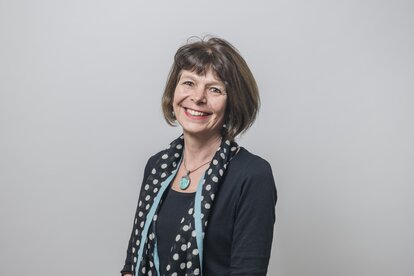with Sandip Poudel
The drive to meet Saraswati Bachhar (pictured) and her family takes us along many kilometres of rutted dirt track road, surrounded on either side by coppiced, Forest Department plantations of Eucalyptus. In some places, harvested poles are stacked ready for transport; the smell of Eucalyptus leaves blows in through the windows of our vehicle.
The Tharus
Saraswati and her husband Anjan are Tharus, the indigenous peoples of the plains of Nepal – the Terai. Originally shifting cultivators, the Tharus fared poorly in the rapid settlement of the Terai that has taken place over the past 60 or 70 years. As a group, they are amongst the most socially disadvantaged and economically poor in the country. Saraswati and Anjan have three adult children – a daughter who has married and left home, and two sons, one of whom, Ajit, has recently returned from working in Malaysia (see other blogs). I notice that the other son, Akash, is strangely quiet. His hands shake as he tries to take pictures of us with a borrowed camera. Saraswati points to a scar on Akash’s head; a few years back, he was nearly killed in a motorbike accident, and the family spent over CHF 10,000 in his treatment – most of it taken as a loan.
Accidents and illness are of course a particular disaster for families living in poverty, or just scraping by. Ajit’s work as a migrant labourer served to pay off the loan, but there was nothing left. This explains the enthusiasm with which Saraswati shows us the workings of the Eucalyptus oil distillation unit. It’s an intervention supported by Helvetas under a project named Elam, and one of which Sandip Poudel, the Team Leader, is particularly proud.
The Eucalyptus oil value chain (by Sandip Poudel)
Forest Department plantations of Eucalyptus are locally extensive in parts of the Terai. As a by-product of such plantations, the tree leaves have until recently simply been left to rot on the ground when the poles are harvested., although they are a rich source of oil. In the course of an Area Potential Survey (APS) conducted by Elam, the potential of these leaves for a resource-based business was identified. Eucalyptus oil fetches a high price in Kathmandu, being used as a raw material for a variety of products in Nepal and elsewhere. However, there was no locally available and affordable means of oil distillation.
We discussed this challenge with the director of a metal workshop with whom we have established good relations – he is a supplier of metal parts for suspension bridges built with Helvetas support. With him, we examined existing distillation units on the market, and came up with an affordable, locally made version. The total cost is some CHF 2,500, which is about half the cost of an imported distillation unit. We then worked with a small local company (service provider) that was interested in distributing such distillation units, and supported them in selecting poor but enterprising individuals looking to set up a business. The service provider also arranges a loan at the locally advantageous rate of 15%, and serves to link the producers to the market through contacts with different traders, and the Herbal Association of Nepal. So far this has been highly successful; producers who have worked really hard have been able to pay off the loan on their investment within a single year.
More and more families are expressing an interest in establishing distillation units in the area, and we anticipate that the market will grow rapidly. Given the seasonality of production, we are also encouraging local farmers to grow other oil-rich plants such as camomile and mint, which can be processed when Eucalyptus leaves are unavailable. In some cases, landless families are taking land on lease to this end. Thus the value chain has potential to impact positively on the livelihoods of many families. That noted, those who enter a new market early on often have the greatest success. Already the value of Eucalyptus leaves has been recognised by the contractors who harvest poles, and instead of charging around CHF 50 for a tractor load of leaves, they are now charging CHF 200. Markets are dynamic, and intervening to support the poorest actors in the value chain is a constant challenge.
Looking forward
Meanwhile, Saraswati explains how they are not only “just getting by” these days. With the profits from the Eucalyptus oil, Ajit has recently been able to marry, and she is happy to finally have a daughter-in-law.
Saraswati



